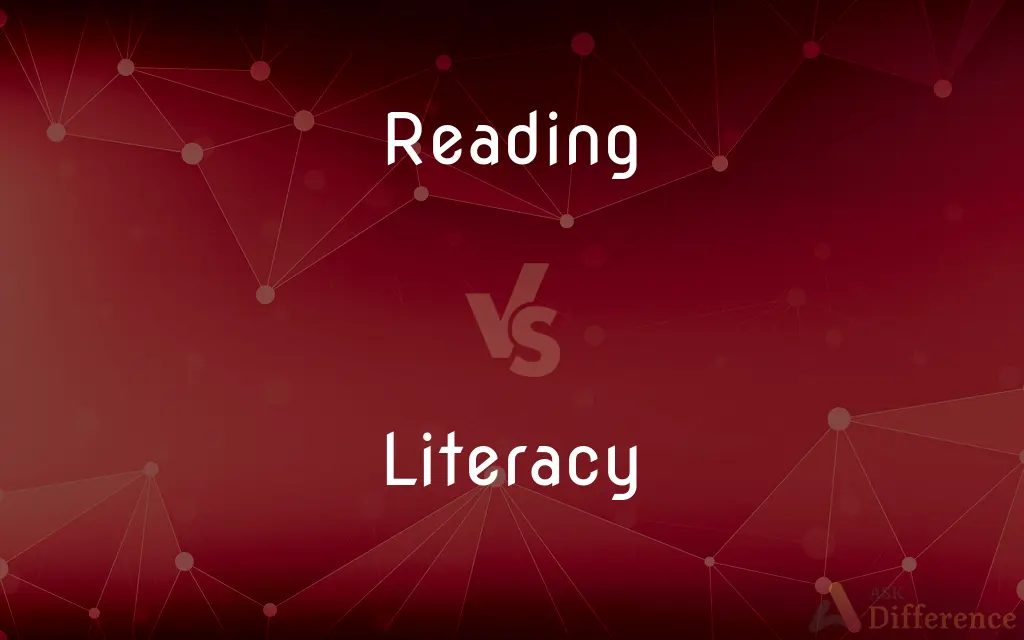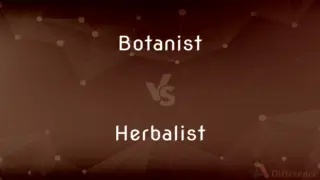Reading vs. Literacy — What's the Difference?
By Maham Liaqat & Fiza Rafique — Updated on April 27, 2024
Reading is the act of decoding and understanding written text, whereas literacy encompasses a broader set of skills including reading, writing, and the comprehension and interpretation of text.

Difference Between Reading and Literacy
Table of Contents
ADVERTISEMENT
Key Differences
Reading is a foundational skill within literacy, focusing on the ability to recognize and decode symbols and words in a text. It is the initial step in acquiring literacy skills, enabling further learning and comprehension. On the other hand, literacy is a comprehensive term that not only includes reading but also writing, understanding, and critically interpreting written content.
Reading skills are essential for basic literacy, allowing individuals to access written information. Whereas literacy, by incorporating writing and comprehension, enables individuals to communicate effectively, express ideas, and engage with others’ thoughts through written form.
Literacy implies a level of proficiency that goes beyond just reading text; it involves analyzing and making inferences from what is read, which are higher cognitive skills. In contrast, reading might simply involve the mechanical process of word recognition without deeper understanding or analysis.
Reading is often taught as the first step in education systems, focusing on phonics, vocabulary, and basic interpretation skills. Literacy, however, is developed through continued education and practice, encompassing advanced comprehension and communication skills.
While reading can be seen as a technical skill, literacy is often viewed as a critical educational goal that significantly impacts social and cognitive development. Literacy enhances one’s ability to participate fully in society, access and manage information, and continue learning throughout life.
ADVERTISEMENT
Comparison Chart
Definition
The act of decoding written or printed text.
The ability to read, write, understand, and interpret texts.
Skills Included
Word recognition, phonemic awareness, fluency.
Reading, writing, comprehension, critical thinking.
Educational Focus
Taught primarily in early schooling.
Developed throughout all levels of education.
Purpose
To understand written content at a basic level.
To communicate effectively and engage with written content.
Impact on Individuals
Provides access to information.
Enables full participation in society and continuous learning.
Compare with Definitions
Reading
Process of interpreting symbols and words.
Reading a book involves understanding the text on each page.
Literacy
Supports critical thinking and problem-solving.
Literacy allows people to evaluate information and make informed decisions.
Reading
Primarily about decoding text.
Reading fluently involves fast and accurate recognition of words.
Literacy
Involves comprehensive skill sets.
Literacy in the digital age includes understanding online texts and multimedia.
Reading
Fundamental skill in literacy.
Early education focuses heavily on teaching children to read.
Literacy
Crucial for lifelong learning.
Literacy skills help individuals to continue learning new skills throughout their lives.
Reading
Can be enjoyed as a leisure activity.
Reading novels is a popular pastime for many people.
Literacy
Ability to read and write proficiently.
Literacy enables people to fill out job applications and write emails.
Reading
Necessary for daily activities.
Reading instructions helps in assembling furniture correctly.
Literacy
Essential for full social and civic participation.
Literacy is necessary for understanding laws, voting, or participating in community activities.
Reading
Reading is the process of taking in the sense or meaning of letters, symbols, etc., especially by sight or touch.For educators and researchers, reading is a multifaceted process involving such areas as word recognition, orthography (spelling), alphabetics, phonics, phonemic awareness, vocabulary, comprehension, fluency, and motivation.Other types of reading and writing, such as pictograms (e.g., a hazard symbol and an emoji), are not based on speech based writing systems. The common link is the interpretation of symbols to extract the meaning from the visual notations or tactile signals (as in the case of Braille).
Literacy
Literacy is popularly understood as an ability to read and write in at least one method of writing, an understanding reflected by mainstream dictionaries. In this view, illiteracy would be considered to be the inability to read and write.Some researchers suggest that the history of interest in the concept of “literacy” can be divided into two periods.
Reading
The act or activity of one that reads.
Literacy
The condition or quality of being literate, especially the ability to read and write. See Usage Note at literate.
Reading
The act or practice of rendering aloud written or printed matter
Skilled at forensic reading.
Literacy
The condition or quality of being knowledgeable in a particular subject or field
Cultural literacy.
Biblical literacy.
Reading
An official or public recitation of written material
The reading of a will.
A reading by the poet of her own works.
Literacy
The ability to read and write.
Reading
The specific form of a particular passage in a text
A manuscript with a variant reading.
Literacy
The ability to understand and evaluate something.
Computer literacy; media literacy
Reading
The distinctive interpretation of a work of performing art given by the person or persons performing it.
Literacy
State of being literate.
Reading
An interpretation or appraisal
He gave us his reading of the situation.
Literacy
The ability to read and write
Reading
Written or printed material
The survivors' account is fascinating reading.
Reading
The information indicated by a gauge or graduated instrument.
Reading
Present participle of read
Reading
The process of interpreting written language.
The student is behind in his reading by several chapters.
Reading
The process of interpreting a symbol, a sign or a measuring device.
Reading
A value indicated by a measuring device.
He glanced across and took note of the speedometer reading.
Reading
An event at which written material is read aloud.
I attended a poetry reading.
Reading
An interpretation.
That's my reading of the current situation.
Reading
Something to read; reading material.
Reading
The extent of what one has read.
He's a man of good reading.
Reading
(legislature) One of several stages a bill passes through before becoming law.
Reading
A piece of literature or passage of scripture read aloud to an audience.
After the homily there will be two readings from the Bible.
Reading
The content of a reading list.
Reading
The act or process of imagining sequences of potential moves and responses without actually placing stones.
Reading
The act of one who reads; perusal; also, printed or written matter to be read.
Reading
Study of books; literary scholarship; as, a man of extensive reading.
Reading
A lecture or prelection; public recital.
The Jews had their weekly readings of the law.
Reading
The way in which anything reads; force of a word or passage presented by a documentary authority; lection; version.
Reading
Manner of reciting, or acting a part, on the stage; way of rendering.
Reading
An observation read from the scale of a graduated instrument; as, the reading of a barometer.
Reading
Of or pertaining to the act of reading; used in reading.
Reading
Addicted to reading; as, a reading community.
Reading
The cognitive process of understanding a written linguistic message;
He enjoys reading books
Reading
A datum about some physical state that is presented to a user by a meter or similar instrument;
He could not believe the meter reading
The barometer gave clear indications of an approaching storm
Reading
A particular interpretation or performance;
On that reading it was an insult
He was famous for his reading of Mozart
Reading
Written material intended to be read;
The teacher assigned new readings
He bought some reading material at the airport
Reading
A mental representation of the meaning or significance of something
Reading
A city on the River Thames in Berkshire in southern England
Reading
A public instance of reciting or repeating (from memory) something prepared in advance;
The program included songs and recitations of well-loved poems
Reading
The act of measuring with meters or similar instruments;
He has a job meter reading for the gas company
Common Curiosities
Are digital literacy and traditional literacy the same?
Digital literacy builds on traditional literacy but includes additional skills related to digital tools and media.
What are the signs of good literacy skills?
Effective communication, both in writing and verbally, along with the ability to understand and critically analyze texts, indicate strong literacy skills.
What role does reading play in achieving literacy?
Reading is the base upon which other literacy skills are built, such as writing and critical thinking.
How can literacy be measured?
Through assessments that evaluate reading comprehension, writing skills, and the ability to interact with and produce text.
Is reading the only component of literacy?
No, literacy includes reading, writing, and the ability to understand and critically evaluate text.
How does literacy impact an individual’s life?
Literacy enhances personal, educational, and professional opportunities, allowing for better societal and civic engagement.
How do education systems promote literacy?
Through structured curriculums that cover reading, writing, and comprehension from early schooling to higher education.
Can a person be literate without being a good reader?
Proficiency in reading is fundamental to literacy, so weak reading skills generally hinder overall literacy.
What challenges might impair the development of literacy?
Factors such as lack of access to education, learning disabilities, and socioeconomic barriers can impair literacy development.
Is literacy a goal achievable worldwide?
Global literacy is a goal, though challenges remain due to disparities in educational resources and access.
Why is literacy considered a critical 21st-century skill?
It is essential for navigating and succeeding in the information-rich, digital-driven global environment.
Can literacy improve health outcomes?
Yes, literacy enhances the ability to understand health information and make informed decisions, improving health outcomes.
Can literacy change over time?
Yes, literacy demands and standards evolve, especially with advancements in technology and changes in communication methods.
How do reading and literacy rates impact economic development?
Higher literacy rates are associated with greater economic productivity and innovation.
How does cultural context affect literacy?
Literacy practices and requirements can vary widely depending on cultural contexts and societal needs.
Share Your Discovery

Previous Comparison
Botanist vs. Herbalist
Next Comparison
Constructor vs. MethodAuthor Spotlight
Written by
Maham LiaqatCo-written by
Fiza RafiqueFiza Rafique is a skilled content writer at AskDifference.com, where she meticulously refines and enhances written pieces. Drawing from her vast editorial expertise, Fiza ensures clarity, accuracy, and precision in every article. Passionate about language, she continually seeks to elevate the quality of content for readers worldwide.












































